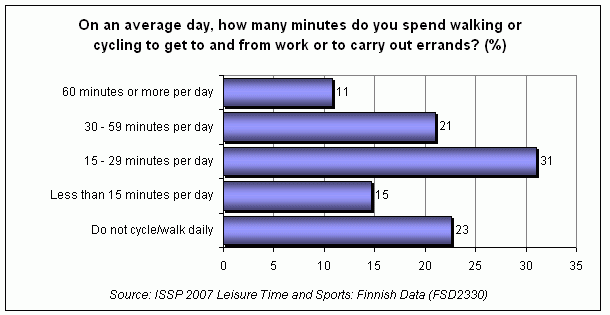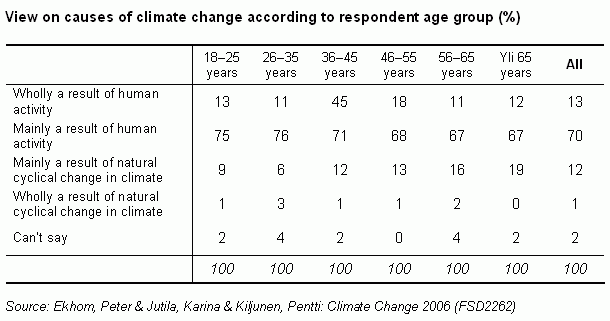Citing Archival Data
Data sources used in research publications must be cited accurately and in sufficient detail. Sources are cited within the text, within tables and graphs, and in publication references.
A citation gives credit to the source and distributor. It also contains copyright information. Other researchers may want to analyse the same dataset and need the bibliographic information provided in the citation to identify and locate the referenced data. Citations appearing in publication references are harvested by electronic social science indexes, providing acknowledgement to the original researchers. Funding agencies can track levels of usage of datasets, thus measuring their impact.
All datasets archived at FSD are electronic data sources. They typically consist of data files, questionnaires, other collection instruments and other background material. The source should be cited in all publications where a dataset or even part of it has been used.
A recommended citation is included in the study descriptions of datasets archived at FSD. It contains the persistent identifiers, PIDs, of the dataset. We assign URN and DOI identifiers. You can copy and use the recommended citation or amend it to be compatible with the citation requirements of the publication. The DOI citation formatter (Opens in a new tab) can be used to edit the citation.
Citation in publication references
When writing publication references, it is important to give sufficient information about electronic data. The following elements should be included in the citation, as they are important in identifying the data: name of the original creator(s) of data and their affiliation, title of the dataset, year of data collection, version, FSD's archival number, persistent identifier, and distributor.
Examples. Datasets with no named author:
Gallup Finland & University of Helsinki: Finnish Voter Barometer 1973 [dataset]. Data version 5.0 (2018-07-12). Finnish Social Science Data Archive [distributor]. DOI: https://doi.org/10.60686/t-fsd1000; URN: https://urn.fi/urn:nbn:fi:fsd:T-FSD1000
Finnish Federation for Social Welfare (STKL): Sociobarometer 1994 [dataset]. Data version 1.0 (2002-03-11). Finnish Social Science Data Archive [distributor]. DOI: https://doi.org/10.60686/t-fsd1129; URN: https://urn.fi/urn:nbn:fi:fsd:T-FSD1129
Examples. Datasets with named author(s):
Ekholm, Peter (Think Tank e2) & Jutila, Karina (Think Tank e2) & Kiljunen, Pentti (Yhdyskuntatutkimus): Climate Change 2006 [dataset]. Data version 2.0 (2018-07-25). Finnish Social Science Data Archive [distributor]. DOI: https://doi.org/10.60686/t-fsd2262; URN: https://urn.fi/urn:nbn:fi:fsd:T-FSD2262
Iltanen, Sonja (University of Art and Design): Clothing Design for Ageing Women 2001-2002: Interviews [dataset]. Data version 1.0 (2009-01-13). Finnish Social Science Data Archive [distributor]. DOI: https://doi.org/10.60686/t-fsd2381; URN: https://urn.fi/urn:nbn:fi:fsd:T-FSD2381
International Social Survey Programme (ISSP) & Blom, Raimo (University of Tampere) & Melin, Harri (University of Turku) & Tanskanen, Eero (Statistics Finland): ISSP 2007: Leisure Time and Sports: Finnish Data [dataset]. Data version 1.0 (2008-03-28). Finnish Social Science Data Archive [distributor]. DOI: https://doi.org/10.60686/t-fsd2330; URN: https://urn.fi/urn:nbn:fi:fsd:T-FSD2330
Applying General Citation Styles
The examples presented on this page are based on the national SFS 5989 standard for references. However, in higher education and scholarly publications, internationally recognised citation styles are predominantly used. These styles, with the exception of APA 7, do not explicitly address how to cite research data. Users must adapt them according to the situation. Below are examples of some of the most important ones. The DOI citation formatter (Opens in a new tab) can be used to edit the citation.
Citation examples in different citation styles:
SFS 5989
Nystedt, Ursula (University of Jyväskylä): Support Networks of Families with Special Needs Children 2014 [dataset]. FSD3066, version 1.0 (2015-12-18). Tampere: Finnish Social Science Data Archive [distributor]. https://doi.org/10.60686/T-FSD3066
APA 7
Nystedt, U. (University of Jyväskylä). (2015). Support Networks of Families with Special Needs Children 2014 (FSD3066, Version 1.0) [data file]. Finnish Social Science Data Archive. https://doi.org/10.60686/T-FSD3066
Harvard
Nystedt, U. 2015. 'Support Networks of Families with Special Needs Children 2014' [data file]. Available at: https://doi.org/10.60686/T-FSD3066.
Vancouver
Nystedt U. Support Networks of Families with Special Needs Children 2014 [Internet]. Finnish Social Science Data Archive; 2015. Available from: https://doi.org/10.60686/T-FSD3066
Oxford
Nystedt, U. (2015). Support Networks of Families with Special Needs Children 2014 (Version 1.0)[data file]. Finnish Social Science Data Archive. Available: https://doi.org/10.60686/T-FSD3066
MLA
Nystedt, Ursula. Support Networks of Families with Special Needs Children 2014. Finnish Social Science Data Archive, 2015, Tampere. https://doi.org/10.60686/T-FSD3066
Chicago
Nystedt, Ursula. Support Networks of Families with Special Needs Children 2014. V1.0, 2014. Finnish Social Science Data Archive. https://doi.org/10.60686/T-FSD3066.
IEEE
U. Nystedt. "Support Networks of Families with Special Needs Children 2014", Finnish Social Science Data Archive, 2015. [data file]. Available: https://doi.org/10.60686/T-FSD3066
In-text citation
Within text, electronic data sources are referenced with the author's last name. If there is no author named, dataset title is used. Data collection year is included in the reference.
Examples.
Over 80% think that climate change is wholly or mainly the result of human activity (Ekholm et. al. 2006).
In a 1973 survey, almost 70% agreed or strongly agreed with the statement that Finnish agriculture should receive more subsidies to prevent the country from becoming too dependent on imported food (Finnish Voter Barometer 1973).
Over 40% take part in physical activities daily or several times a week (ISSP 2007: Leisure Time and Sports: Finnish Data).
Citations in graphs and tables
When citing the source in graphs and tables, it is best to include the dataset archival number.


Questionnaire citations or citing related material
If the data itself (questions and response categories) have been translated into English, variable information is freely available on the FSD website. Questionnaires are mainly available in Finnish and/or Swedish only. If there is a questionnaire in English, it is published on the website.
Questionnaires and any other contextual materials form part of the dataset. If they are used as sources, the citation must contain information of the dataset itself, in the same manner as the citation of an article in an edited monograph includes information about the monograph itself.
As questionnaires and other related materials are web documents, citations should include their web address and date of retrieval.
Example. Citing a questionnaire when there is named author(s):
Oksanen, Atte & Kaakinen, Markus & Sirola, Anu & Savolainen, Iina: YouGamble 2018: US Data. Questionnaire [Web document]. Tampere: Finnish Social Science Data Archive [distributor]. <https://services.fsd.tuni.fi/catalogue/FSD3591/PIP/quF3591_eng.pdf> [retrieved 20 February 2025]. The questionnaire is part of the dataset Oksanen, Atte (Tampere University) & Kaakinen, Markus (Tampere University) & Sirola, Anu (Tampere University) & Savolainen, Iina (Tampere University): YouGamble 2018: US Data [dataset]. Data version 1.0 (2022-09-20). Finnish Social Science Data Archive [distributor]. DOI: https://doi.org/10.60686/t-fsd3591; URN: https://urn.fi/urn:nbn:fi:fsd:T-FSD3591
Example. Citing a variable:
Puohiniemi, Martti (Limor Oy): Finnish Values and Everyday Life 2005 [dataset]. Data version 1.0 (2024-06-12). Finnish Social Science Data Archive [distributor]. DOI: https://doi.org/10.60686/t-fsd3748; URN: https://urn.fi/urn:nbn:fi:fsd:T-FSD3748. [Tyo507] To what extent do you agree or disagree with the following statements about working life? My work is a great creative challenge for me <https://services.fsd.tuni.fi/catalogue/FSD3748?tab=variables&variable=TYO507&lang=en&study_language=en> [cited 20.2.2025].
